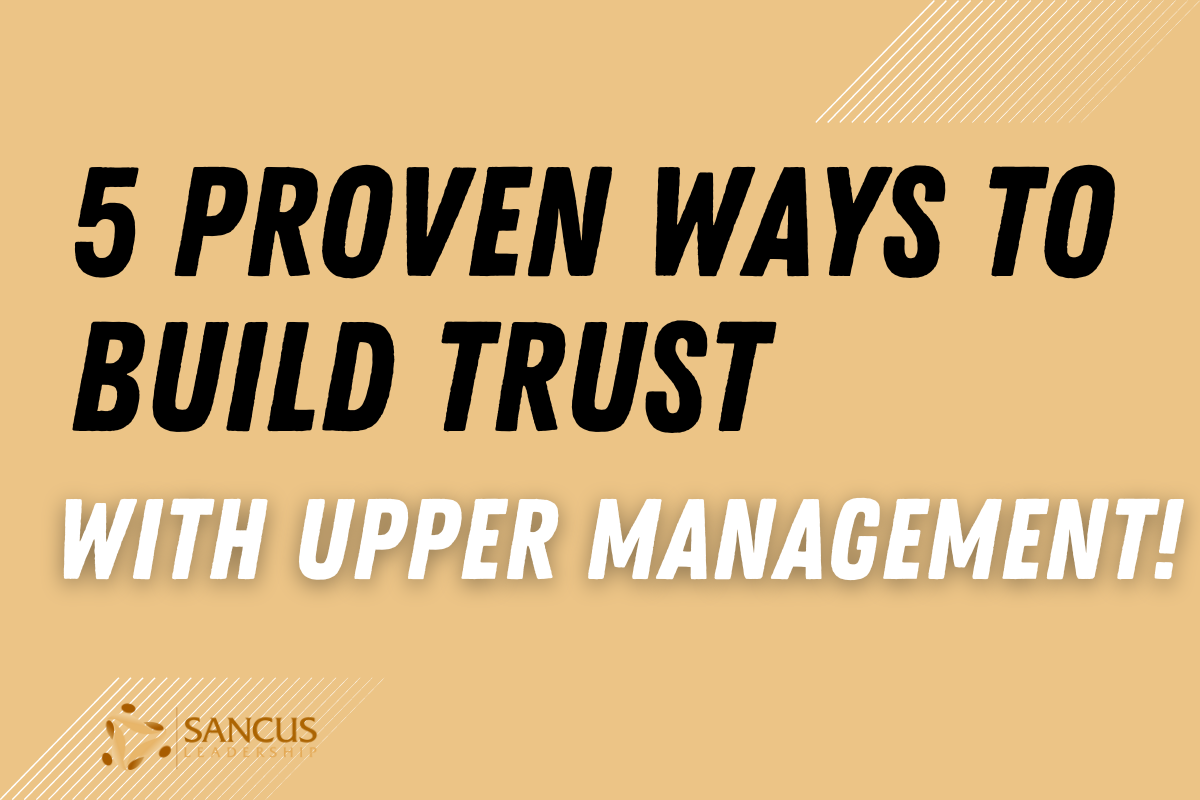Your cart is currently empty!

5 Proven Ways to Build Trust With Upper Management (For Leaders)
Managers have many responsibilities; making sure that their teams are meeting objectives, creating a conducive work environment, and ensuring cooperation are just a few of them. On top of that, a manager’s most important task is building trust with upper management.
You can build trust with upper management by adhering to deadlines and being transparent about what’s happening in the workplace. It would help if you also worked at becoming a great leader by handling conflicts before your boss has to and becoming indispensable.
In this article, we’ll go over all these ways in detail so you know what you have to do and how you can do it.
How Do You Build Trust With Senior Management?


Establishing a professional and collaborative relationship with senior management is crucial to being a manager. Here is another way of looking at it:
Build trust with senior management by being clear about expectations and meeting them. Develop your leadership skills and ensure you have an open line of communication with your bosses. Resolve issues independently so that senior management can focus on their responsibilities.
Being trusted by your supervisors is excellent for several reasons. Not only are you more likely to be charged with larger projects and promotions, but there’s also a psychological effect. Research has found that feeling trusted enhances self-esteem, improving workplace performance.
There are many ways to build trust; as a manager, it’s your job to understand those ways.
1. Honor Your Commitments
One of the critical roles a manager has is ensuring that deadlines are met. If you agree to a task, complete it within the specific time frame.
Missing deadlines and delaying work are quick ways of getting your boss to dislike you and not trust you. When you agree on a timeline, try to achieve the goals set.
Ask your senior management if finishing the task on time or with high quality later is more important.
As soon as you realize that you might not make the deadline, it would help if you inform your manager; this allows them to decide to extend the deadline or change the task’s ambition level.
Clear and in/time communication can solve most issues while avoiding frustration.
When hiring and promoting managers, bosses often look at metrics; they want to know your performance over the years and which areas you lack. If they see that you’re reliable and meet the commitments you’ve agreed to, they’ll quickly grow to trust you.
2. Be Honest and Upfront With Senior Management
Effective communication is one of the most valued traits of a manager. Communicate honestly about the level of work and what’s occurring in the organization. Keep your boss updated with which goals have been achieved and which ones still need to be.
Effective communication is one of the most valued traits of a manager. Communicate honestly about the level of work and what’s occurring in the organization.
One of the best ways of getting your boss to trust you is by ensuring they’re always aware of information and changes.
Inform them about what’s occurring in projects you’re managing, how the team you’re leading works, and how employees cooperate.
Don’t put them in a situation that makes them feel as if there was information that was intentionally kept from them. If they know you’re being honest and upfront with them, they’ll grow to trust you and your work.
Although this point seems simple, managers often need help with it, especially when they make a mistake.
It’s human nature to believe that making mistakes can result in losing your job or causing upper management to distrust you. However, informing them of mistakes made allows them to predict what will happen next and prevent problems from becoming more prominent.
3. Become Your Boss’s Right-Hand Person
Most bosses have a right-hand colleague who understands them and their needs. These people are trusted because they are reliable and know what no one else in the work environment sees. That’s why you can reap great benefits of being this person.
The quickest way to do this is to understand what your boss prioritizes. Ask yourself the following questions.
- What does your boss want to achieve?
- What makes them tick?
- What sort of projects or clients is your boss interested in?
- What does your boss value?
- What will your boss need next that they haven’t asked for yet_
Knowing the answers to these questions will help you understand what your boss prioritizes in the workplace and manage projects and subordinates accordingly.
Make their priorities yours, and they’ll begin to trust you because they’ll see that you know them and that you value the same things they do. When your boss starts to confide in you, you’ll know that they’re growing to trust you.
4. Be a Good Leader
Leading is one of the essential requirements of a manager. While managing objectives and deadlines, you are also leading a team. Developing a good relationship with your boss should also depend on becoming a good boss to your subordinates.
Being a leader means is to direct your employees to achieve the goals your boss wants to be completed. Establish a clear vision you want your employees to reach and help them get it. Make well, thought-out decisions for the company’s and employees’ good.
Establish a clear vision you want your employees to reach and help them get it. Make well, thought-out decisions for the company’s and employees’ good.
Leading your employees means gaining their trust. Show integrity, and your employees will grow to trust you. Their support will show your boss how they respect and trust your judgments.
Having respect for your subordinates shows that you’re leading well and a manager worth trusting, which will encourage your boss to trust you as well.
5. Handle Problems So Your Boss Doesn’t Have To
One of the reasons why bosses begin to trust managers is because they handle conflicts and issues before they can accelerate and pose more significant problems for the organization.
Every boss wants a smooth and efficient execution of operations, and the managers that ensure that that can occur quickly gain their trust.
Every boss wants a smooth and efficient execution of operations, and the managers that ensure that that can occur quickly gain their trust.
In the military, we used to say, “every problem should be solved at the lowest level possible.”
Conflicts in the workplace can reduce productivity and increase absenteeism; both factors will hinder the smooth functioning of the business and will upset your boss. Specifically, in smaller teams, issues between two individuals can affect the harmonious collaboration of team members and create a hostile environment.
As a manager, one of your positions is that of a disturbance handler. Address issues before they become more significant problems for your boss to handle. Due to your position in the business hierarchy, subordinates will most likely listen to you and look to you for guidance.
| 5 ways to build trust | Description |
| Honor Your Commitments | Managers must complete tasks within specified time frames, and communicate with senior management if they cannot. Reliable performance is important in building trust with superiors. |
| Be Honest and Upfront With Senior Management | Managers should communicate honestly with superiors about work progress and organization changes. Being transparent and upfront about mistakes made can prevent bigger problems from occurring. |
| Become Your Boss’s Right-Hand Person | Understanding your boss’s priorities can help you become their go-to colleague for understanding their needs. Aligning with your boss’s goals will help you become more trusted. |
| Be a Good Leader | Managers must direct their employees to complete tasks and establish a clear vision for the team to follow. Leaders must gain the trust and respect of their subordinates to be a manager worth trusting. |
| Handle Problems So Your Boss Doesn’t Have To | Managers must address conflicts before they become more significant issues that superiors must handle. Handling issues at the lowest level possible is important for smooth business operations. |
How To Handle Workplace Conflict
Take an active role in conflict resolution and deal with the problem head-on instead of avoiding it.
One best ways to prevent conflict is to create a workplace environment that promotes strong employee relations and trust between team members.
Try to understand what’s causing the problem and why it’s being pushed in the first place. Is there something going on that you aren’t aware of? Are the conflicting parties refusing to cooperate for professional or personal reasons? Be actively involved and try to resolve the issues before they become a noticeable hindrance.
If you’re unsure how to recognize and handle workplace conflict, check out this YouTube video to understand what sort of conflicts you can expect and the best ways of managing them.
Being on top of things will make your boss thank you and trust you for future projects and promotions.
Final Thoughts
A manager has many roles and responsibilities. Getting your boss to trust you is one of the most important ones. Their trust would increase your morale and help you become a better leader and manager.
There are multiple factors to remember as you work towards gaining their trust, such as honesty, dedication, reliability, and responsibility. However, following these guidelines will help you quickly gain upper management’s trust!
